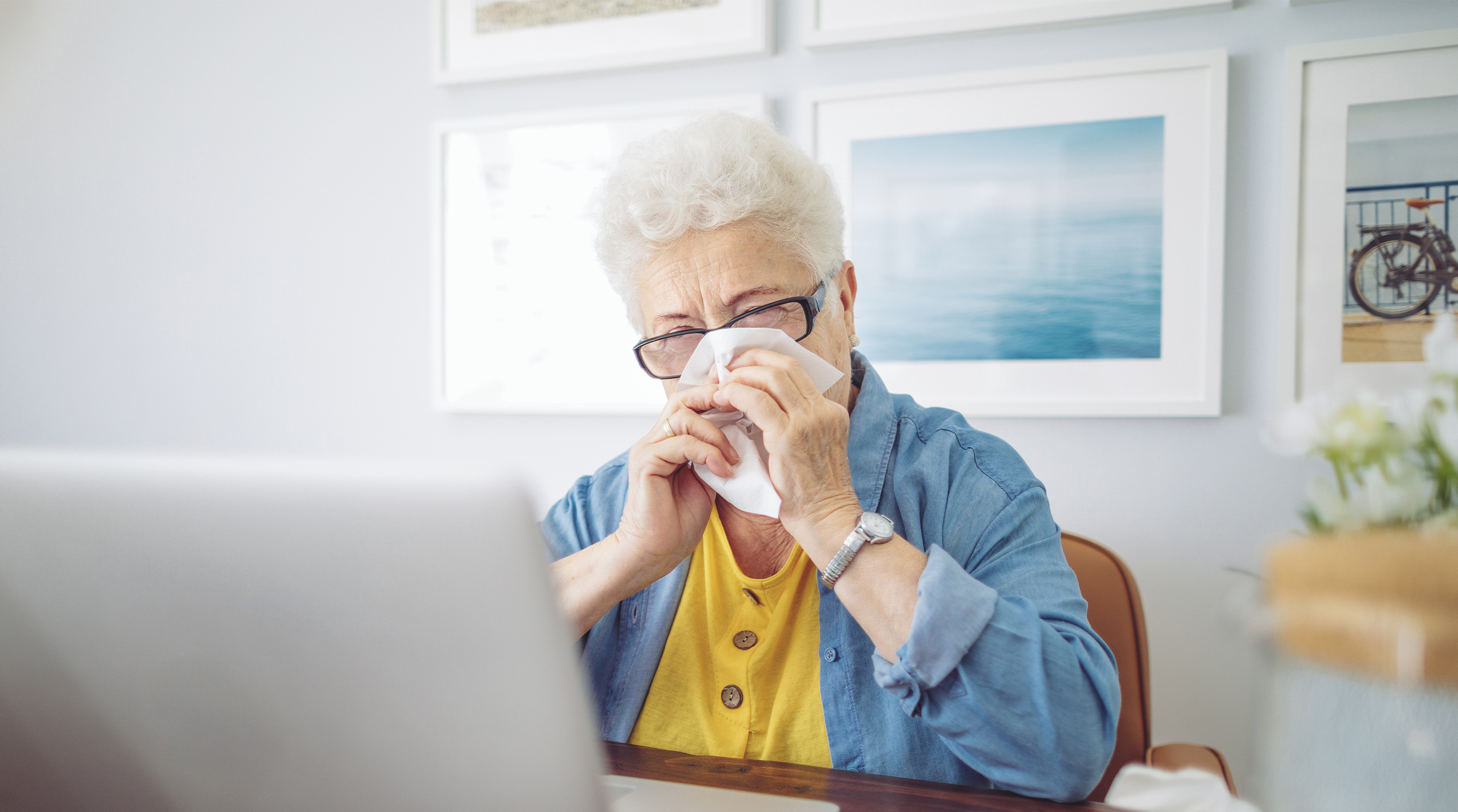It’s easy to be a fair-weather fan, especially when it’s in reference to actual weather. After all, nothing beats a little time outdoors in the warmth of the sun, surrounded by trees, flowers, and nature. Unless, of course, you are one of the millions who suffer from the sneezing, congestion, runny nose, and other bothersome symptoms associated with allergies. In fact, according to the CDC, more than 50 million Americans experience allergies every year—making allergies the sixth-leading cause of chronic illness in the nation.
In most cases, allergies manifest early in childhood. However, that doesn’t necessarily mean senior adults are out of the woods, so to speak. In fact, it isn’t uncommon for seniors to suddenly develop allergies in their later years—or even have those late-developing allergies misdiagnosed as part of a preexisting condition they’re battling. And if misdiagnosed, the inflammatory response to allergies can pose a significant risk to greater issues, such as chronic illness. That’s why it’s important to properly diagnose and treat allergies quickly and effectively.
HOW TO KNOW IF YOU HAVE ALLERGIES
The best practice is to seek professional attention from a doctor or health provider. However, there are a few things you can do to self-diagnose and see if you’ve developed a case of allergies.
The best place to start is identifying the most common symptoms you may be experiencing, such as runny nose, sniffling, sneezing, and itchy or watery eyes. It’s important to note that fever, sore throat, and body aches are more indicative of a cold or the flu, and not allergies. Also of note, certain prescriptions can make allergy symptoms worse or lead you to mistake the medication’s side effects as allergies, so be sure to consult a doctor for a professional opinion if you’re uncertain.
AVOID THE ALLERGENS
The next best step in managing or even minimizing allergies is to simply avoid known allergens as much as possible. And, yes, that might mean finding something other than fresh-cut flowers to place at the center of the dining table or not spending extended amounts of time mowing the lawn or tending the garden.
Since most seasonal allergies are commonly related to pollen, here are some additional things that can be done to help you or a loved one avoid allergens:
- Check the daily pollen count in your area. A weather app is the most convenient way to check the pollen count in your area and determine whether it might be best to stay indoors. You may also search your area’s pollen count online or by contacting your local news/weather provider.
- If possible, dry your laundry in a dryer rather than outside on the clothesline. While most people have embraced indoor washers and dryers, there are many who still prefer drying their clothes and linens in the sun. As such, it’s an easy way for allergens to ride your laundry like a trojan horse right into nearly every nook and cranny of your home.
- Keep the windows closed. Your home is your safe zone. Opening the doors and windows may be a nice way to let in a little fresh air, but it can also invite an allergen invasion—especially on days when the pollen count is high. Instead, use air conditioning, if possible.
- Use a saline nasal rinse. A nasal rinse can clear mucus from your sinuses, as well as ease allergy symptoms. Additionally, it can help wash out any bacteria or allergens you may have inhaled.
- Give probiotics a try. Some strains of beneficial bacteria generated by probiotics have been shown to regulate t-cells, which can help produce a stronger immune response to common allergens.
- Wear a mask. Mask-wearing has become more common in recent years. Not only does it help prevent the transmission of cold or flu viruses, but it can also protect you from pollen and other airborne allergens.
- Regularly clean your home. Consistent cleaning is a great way to keep your home a relatively allergen-free safe space. This includes dusting all surfaces, vacuuming carpets and rugs, and regularly laundering towels and linens.
- Regularly change your air filter. Air filters are great for helping to remove harmful airborne particles from indoor spaces, such as allergens, smoke, mold, dust, etc. If added filtration is desired, you might also consider an air purifier, as well.
- Use a humidifier. Humidifiers can help reduce allergy symptoms, as well as provide relief to stuffy, inflamed sinuses. However, it is important to properly maintain them, as it is easy for bacteria and mold to grow—which can worsen symptoms.
- Try an over-the-counter remedy. There are many types of nonprescription medications that can help ease symptoms. These remedies come as oral antihistamines, nasal sprays, decongestants, etc. Be sure to consult your doctor to see what’s best for you.
ENJOY THE INDOOR ACTIVITIES PROVIDED AT BRIDGE SENIOR LIVING COMMUNITIES
When seasonal allergies strike, or are at their highest, rest assured there are plenty of ways to stay active indoors. Whether it’s working on a new hobby, like ceramics or painting, reading a book in the library, playing a game, swimming in an indoor pool, or simply watching a movie from the comfort of your apartment home, residents of Bridge Senior Living communities can count on a wide variety of indoor activities all year long.
Sources: Allergy and Aging: An Old/New Emerging Health Issue (https://www.ncbi.nlm.nih.gov/pmc/articles/PMC5362176/); Medications and Older Adults (https://www.aaaai.org/conditions-and-treatments/library/allergy-library/medications-and-older-adults); How Seasonal Allergies Affect Seniors (https://www.unitedmedicareadvisors.com/how-seasonal-allergies-affect-seniors)









